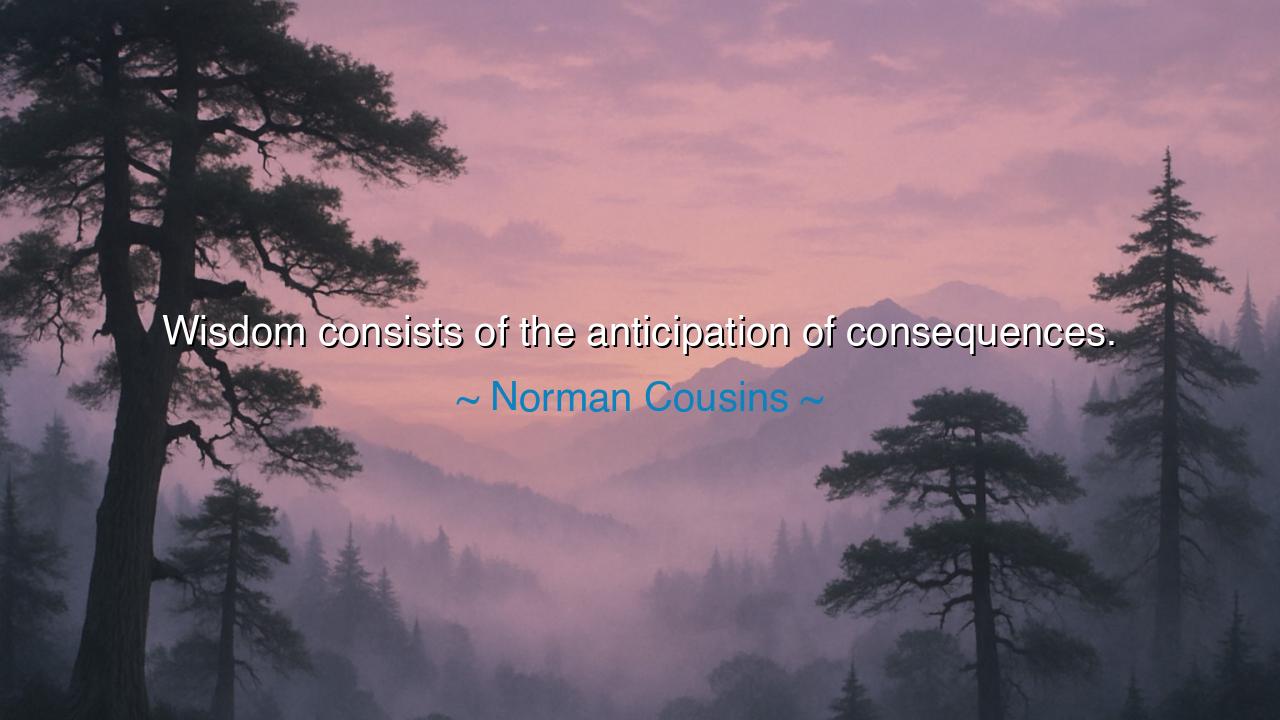
Wisdom consists of the anticipation of consequences.






Hear this, O Seekers of Truth! In the words of Norman Cousins, a sage of the modern age, we are told, “Wisdom consists of the anticipation of consequences.” In this declaration, Cousins speaks to the heart of what it means to be truly wise, for wisdom is not found in the accumulation of knowledge alone, but in the foresight to understand what flows from our actions. The wise man does not act blindly; he sees beyond the moment, gazing into the ripple of time that will follow every decision. His heart beats not in haste, but with the steady rhythm of a soul that comprehends the far-reaching tides of cause and effect.
In the grand tapestry of life, every thread we weave sends ripples through the fabric of existence. Yet, how often do we, the children of this earth, act without contemplating what will follow? It is the heedless man, rushing forward without thought, who brings destruction upon himself. But the wise man pauses, for he knows that every step carries weight, and every word he speaks sends forth waves that will one day return to him. His power lies not in the act itself, but in the anticipation of what that act will bring.
Consider, if you will, the tale of the mighty King Croesus of Lydia, whose wealth was unmatched in the ancient world. In his pride and hubris, he sought the counsel of the Oracle of Delphi, asking if he should wage war upon the Persian Empire. The oracle, in its cryptic wisdom, told him that if he waged war, he would destroy a great empire. Croesus, blind to the deeper meaning, interpreted the prophecy as a sign of his own victory. But in the end, it was he who fell, his kingdom crumbling beneath the weight of his impetuous decision, for he failed to anticipate the consequences of his actions. The wise king does not merely hear the call of ambition; he listens deeply to the echoes of what may come.
Thus, we must learn from this tale. The wise are those who, before they leap, pause to measure the distance and feel the winds that may carry them. They understand that the seeds they plant today will grow into the trees that shade or scorch them tomorrow. Wisdom is a prudent heart, one that not only seeks the moment but understands the seasons that follow. The truly wise ask themselves: "What will this choice bring to me, to those I love, and to the world?" And in the stillness of their minds, they see the future stretching before them, clear as a river's course.
Therefore, O Children of Destiny, heed the words of the ancient and modern sages alike. Do not act in haste, for the world is not made of fleeting moments but of endless consequences. Anticipate them, and you shall walk in the light of wisdom. The future is not a mystery to fear, but a path to understand. Walk it with foresight, and you will master the winds of fate.






PDPhuong Dinh
This statement prompts reflection on learning from experience. If wisdom is tied to anticipating consequences, then mistakes and past experiences become valuable tools for refining judgment. I wonder whether people who fail to anticipate outcomes are less wise, or if wisdom can grow through trial and error. How can education, mentorship, or reflective practices enhance one’s ability to foresee consequences, and is there a limit to how much we can accurately predict in complex, interconnected systems?
TVDo Thi Tuong Vi
I feel intrigued by this quote because it emphasizes responsibility. Wisdom appears linked to accountability: predicting outcomes helps prevent harm and promotes ethical choices. But I wonder how individuals handle uncertainty, where consequences are unclear or probabilistic. Are there philosophical or psychological frameworks that guide the evaluation of potential outcomes? How do experience, reflection, and intuition contribute to building the skill of anticipating consequences accurately over time?
MTMINH THUAN
This perspective feels practical and cautionary. It suggests that a wise person evaluates potential consequences before acting, rather than acting impulsively. I’m curious how this anticipatory approach intersects with creativity and innovation—do people who anticipate too carefully risk stifling novel ideas? Conversely, can cultivating foresight enhance leadership and long-term planning? I’d like insight into strategies that allow individuals to anticipate consequences while remaining flexible and adaptive.
HNPham Hai Nam
Reading this evokes curiosity about the ethical dimension of anticipating outcomes. If wisdom involves foreseeing consequences, how do we account for unintended effects or complex systems where outcomes are unpredictable? I also wonder whether this principle applies universally, or if context, culture, and individual perspective affect how consequences are interpreted and weighed. How can one balance foresight with action, ensuring that overthinking does not lead to paralysis?
THdo thi ha
This quote makes me reflect on the importance of foresight in decision-making. It suggests that true wisdom is not just about knowledge, but about predicting the outcomes of our actions. I wonder how much of this ability can be learned versus being an innate skill. Are there methods or practices, like scenario planning or reflective thinking, that can improve our capacity to anticipate consequences effectively in both personal and professional life?